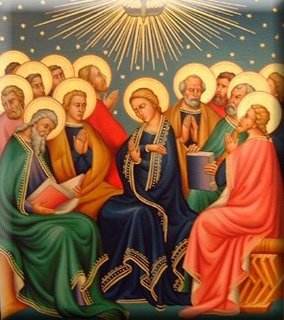“Suddenly there came from heaven a sound like the rushing of a violent wind, and it filled the whole house where they were sitting. And there appeared to them tongues like flames of fire, divided among them and resting on each one. And they were all filled with Holy Spirit.” (Acts 2, 2-4).
Orthodox Christian Celebration of the Feast of Pentecost
On Pentecost we have the final fulfillment of the mission of Jesus Christ and the first beginning of the messianic age of the Kingdom of God mystically present in this world in the Church of the Messiah. For this reason the fiftieth day stands as the beginning of the era which is beyond the limitations of this world, fifty being that number which stands for eternal and heavenly fulfillment in Jewish and Christian mystical piety: seven times seven, plus one.
Thus, Pentecost is called an apocalyptic day, which means the day of final revelation. It is also called aneschatological day, which means the day of the final and perfect end (in Greek eschaton means the end). For when the Messiah comes and the Lord’s Day is at hand, the “last days” are inaugurated in which “God declares... I will pour out my Spirit upon all flesh.” This is the ancient prophecy to which the Apostle Peter refers in the first sermon of the Christian Church which was preached on the first Sunday of Pentecost (Acts 2: 1 7; Joel 2: 28-32).
Once again it must be noted that the feast of Pentecost is not simply the celebration of an event which took place centuries ago. It is the celebration of what must happen and does happen to us in the Church today. We all have died and risen with the Messiah-King, and we all have received his Most Holy Spirit. We are the “temples of the Holy Spirit.” God’s Spirit dwells in us. We, by our own membership in the Church, have received “the seal of the gift of the Holy Spirit” in the sacrament of Chrismation. Pentecost has happened to us.
The Orthodox Church has her origin with Jesus Christ and the Holy Spirit, not with a human teacher, or group, nor a code of conduct or religious philosophy. Orthodoxy believes that the Church has her origin in the Apostolic Community called into being by Jesus Christ, and enlivened by the Holy Spirit. The Feast of Pentecost, which is celebrated fifty days after Easter, commemorates the "outpouring'' of the Holy Spirit upon the Apostles and marks the beginning of the mission of the Church to the world. The Orthodox Church believes that she has maintained a direct and unbroken continuity of love, faith, and order with the Church of Christ born in the Pentecost experience.
On that same day through the preaching of St Peter three thousand men and women were baptized. The first Christian community at Jerusalem was formed, from the great day of Apostolic Pentecost (AD 33).After the Martyrdom of St. Stephen followed by the persecution the members of the Jerusalem Church were scattered. 'Go forth therefore,' Christ had said, 'and make all nations My disciples' (Matthew 28, 19). Obedient to this command they preached wherever they went, at first to Jews, but before long to Gentiles also. The Apostolic journeys are recorded by St Luke in the book of Acts; others are preserved in the holy tradition of the Church. Within a very short time small Christian communities had sprung up in all the main centers of the Roman Empire and even in places beyond the Rome.
The administrative structure of primitive church is seen in the letters of St Ignatius, Bishop of Antioch (Attained Martyrdom travelling to Rome, in AD 107). Christian Missionaries travelled to Eastern part of the Roman Empire consisting of cities. Each community in cities governed by Bishops and to assist Bishops there were presbyters or priests, and deacons. The threefold ministry of bishops, priest and deacons were established by the end of first Century. St Ignatius writes “The bishop in each Church, presides the place of God. Wherever the bishop appears, there let the people be, just a wherever Jesus Christ is, there is the Catholic Church (കാതോലികസഭ)”.
Reference: “The Orthodox Church” by Bishop Kallistasware.
Prayer of the Holy Spirit
Heavenly King, Comforter, the Spirit of Truth, everywhere present and filling all things, Treasury of blessings and Giver of life: come
